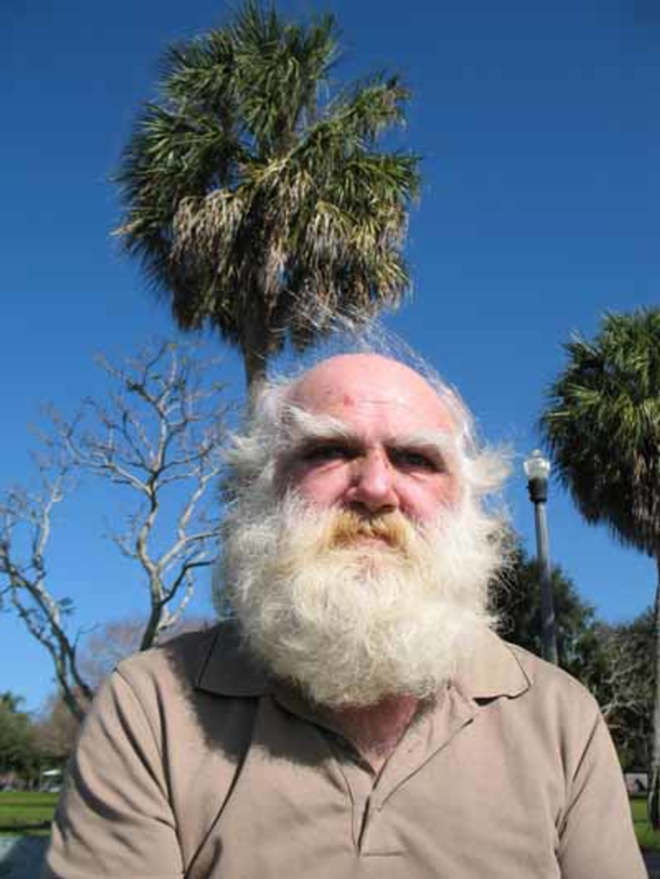On most days, William Shumate spends his time in St. Petersburg's Williams Park. "Pops," as St. Pete's homeless community knows him, has no job. The white-bearded Vietnam veteran injured himself years ago while working as an engineer. At 60 and disabled, he doesn't get jobs easily, so he keeps himself busy by fixing other homeless people's bicycles for free, or sometimes, for a few cigarettes (see "Bike=Freedom," May 28, 2008).
On most nights, when the homeless are kicked out of the park, Shumate walks a few blocks over to a spot in front of City Hall to sleep.
But on December 21, the Pinellas County Coalition for the Homeless invited Shumate to St. Peter's Cathedral for the second annual Homeless Persons' Memorial Day, a ceremony honoring those who have died on the street without notice, regard or honor. This year, according to the PCCH, 22 men and women have died as a result of living on the street. Shumate, along with a handful of other homeless people, was invited to put a face on the issue of homelessness.
At the service, attended by 100 or so people, homeless advocates spoke about the violence against the homeless and the need for more social services. Toward the end, Shumate got up in front of a microphone, took out a Bible and read a passage in the book of Luke about the coming of Jesus. He ended with, "and [she] laid him in a manger, because there was no room for them in the inn."
Afterward, the advocates and homeless walked to the Unitarian Universalist Church on Mirror Lake for a meal. As rain clouds moved in, Shumate left for his sheltered spot near City Hall.
An hour later, he was lying in the hospital.
In 2007, Florida ranked first in the number of attacks on the homeless — for the third year in a row. Out of the Florida cities cited in the report by the National Coalition for the Homeless, St. Pete ranked second with seven incidents. Advocates suspect that, because the record-keeping is inexact, there were many more.
"It's a real problem here," says George Bolden of PCCH. "There are gangs of kids roaming around and doing it for fun. They specifically target homeless people."
Bolden's office is still investigating just how many homeless were killed in 2008. All they have now are street names like Benny, Red and Lil' Bit, a homeless woman who was raped and killed in St. Petersburg earlier this year. And on the night of Dec. 21, Shumate almost became a statistic himself.
According to police reports and Shumate's recollection, nine teenagers approached Shumate and his son (who is also homeless) at their sleeping spot near City Hall. The teens demanded the homeless men give up their bikes, and when Shumate refused, one of the men struck him in the face. When he tried to fight back, the other teens joined in. By the end of the encounter, in which the teens called the two men "homeless scum," Shumate had suffered a minor concussion, broken nose, black eye, damaged ear drum and numerous scratches and bruises. He spent six hours at Bayfront Hospital.
"It was a vicious attack," he says. "And they said they'd done it before and would do it again."
G.W. Rolle, a formerly homeless man who now organizes a "homeless speakers bureau" to educate the community on homeless issues, says people's negative perceptions of homelessness are partly to blame.
"[These kids] grow up not thinking homeless people are humans," he says. "The government, society and the media are not trying to change that perspective. Until they change, the violence will continue."
Unfortunately, Rolle says, these crimes are not a priority.
"The police spend more time in the park, doing surveillance, looking for someone cracking open a beer can, than they do this," he says. "This propels the juveniles to action."
The attack did not leave Shumate with much permanent physical damage, except for his ear. But he is still reeling, psychologically.
"I constantly look over my back now," he says. "When I got back from Vietnam, I never thought I'd have to look behind my back again."


